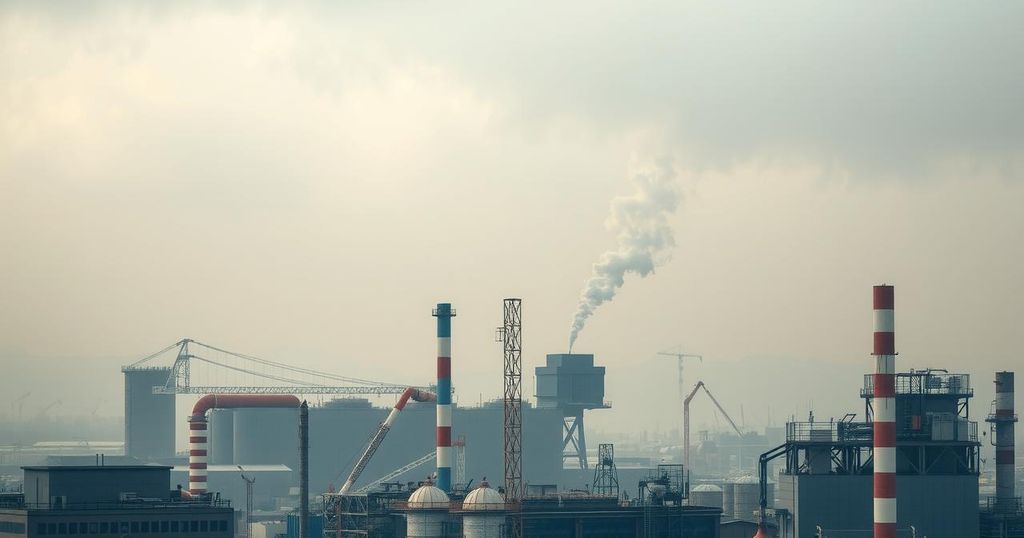The 2024 World Air Quality Report reveals that Ghana, Nigeria, Chad, and Rwanda rank among the world’s most polluted countries, with Chad holding the highest PM2.5 levels. The report highlights a critical air quality crisis in Africa, with serious health and economic implications if immediate actions are not enacted.
The 2024 World Air Quality Report has unveiled alarming air pollution statistics for Africa, with Ghana, Nigeria, Chad, and Rwanda identified among the globe’s most polluted nations. This report emphasizes a deteriorating crisis endangering countless lives on the continent, bringing urgent attention to air quality issues.
Chad is at the forefront of this pollution crisis, experiencing a staggering PM2.5 concentration of 91.8 µg/m³, which is an alarming 18 times higher than the World Health Organization’s (WHO) annual guideline of 5 µg/m³. Nigeria and Rwanda follow closely, ranked 11th and 9th respectively, with PM2.5 levels of 40.1 µg/m³ and 40.8 µg/m³. Ghana, registering 35.8 µg/m³, ranks 14th worldwide.
PM2.5 particles are particularly concerning due to their ability to infiltrate the lungs and bloodstream, contributing to serious health issues such as respiratory and cardiovascular diseases. These pollutants are significantly smaller than dust and human hair, rendering them nearly invisible, yet exceedingly harmful.
Research by the University of Chicago indicates that heightened air pollution levels can decrease lifespans by approximately 2.7 years in severely affected regions. Ghana alone saw an estimated 28,000 fatalities annually due to air pollution as of 2019. The global tally in 2021 revealed 8.1 million deaths attributable to air pollution, illustrating the dire need for urgent intervention.
Ghana’s air pollution has escalated to seven times above WHO safe limits, prompting serious health concerns. Accra faces significant challenges as it is identified as the 16th most polluted capital with PM2.5 levels of 36.3 µg/m³. Additionally, Kumasi raised alarm by becoming Ghana’s most polluted city at 39.5 µg/m³ in this report.
Over recent years, Ghana has seen a marked deterioration in pollution levels, moving from the 27th most polluted nation in 2022 to 14th in 2024. The latest figures reflect a concerning increase in PM2.5 levels from 30.2 µg/m³ in 2022 to 35.8 µg/m³ in 2024.
The 2024 report illustrates Africa’s struggles with pollution, noting that five of the world’s ten most polluted countries are situated on the continent. A disheartening 34% of African cities record PM2.5 levels significantly above WHO guidelines, while data from only 24 of 54 nations were available due to inadequate monitoring infrastructure.
Air pollution in Ghana constitutes not just an ecological challenge but a public health crisis. The alarming statistic of approximately one Ghanaian dying every 19 minutes due to pollution underscores this urgency. Without decisive action, the nation may face monthly fatalities exceeding 2,333 from toxic air.
The economic impact of this crisis could be severe, with projections suggesting that urban air pollution in Ghana might lead to economic losses of $137.8 billion by the year 2040, emphasizing the need for immediate and remedial measures to combat this issue.
In conclusion, the latest World Air Quality Report underscores the critical state of air pollution across Africa, particularly in nations like Ghana, Chad, and Nigeria. The alarming levels of PM2.5 not only pose severe health risks, leading to countless deaths annually but also threaten economic stability. Urgent action in the form of stricter environmental policies and increased investment in air quality monitoring is necessary to address this escalating crisis.
Original Source: www.myjoyonline.com




